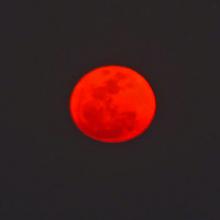A total lunar eclipse will occur on the evening of 31st January 2018 around moonrise, during which the moon will acquire a faint copper colour for about an hour. A total lunar eclipse is a rare and beautiful sight that can be safely viewed with the unaided eye or through telescopes as well as binoculars. A highlight of this eclipse is that it is visible throughout South Asia during a convenient time in the evening when relatively clear skies predicted. All that is needed is a good viewpoint that provides an unobstructed view to the rising moon in the East-North East direction.
A total lunar eclipse occurs on those full moon nights when the sun, earth and moon are aligned almost exactly along a straight line. During total lunar eclipses, although the earth blocks the direct light from the sun from reaching the moon, the moon does not disappear, but instead acquires a glorious copper colour. This is because some of the sunlight is refracted or “bent” by the earth’s atmosphere into the main shadow-cone of the earth. Therefore, although the direct light from the sun to the moon is blocked by the earth, this “sunset and sunrise light” from the whole earth reaches the moon, giving it a dim copper hue.
Viewing the eclipse is completely safe and no equipment is necessary, although binoculars and telescopes would enable a detailed look at the lunar surface. It is important to pick a spot with a good view towards the rising moon. The totality phase when the moon is completely within the shadow of the earth will last for about an hour during 18:22 IST - 19:37 IST. The partial eclipse phase will then begin when the earth's shadow will only cover part of the moon. At 20:41 IST this phase will end and the moon will appear whole, but slightly dimmer than the usual full moon, because it will be within the ‘penumbral’ or lighter shadow of the earth. The eclipse will end at 21:38 IST. “The copper moon tomorrow promises to be quite a visual spectacle, especially in many parts of India with the clear conditions prevailing. It is an occasion to marvel at the wonders that we have in the sky for all to see.” Rajesh Gopakumar, Director, ICTS said.
Several eclipse-watch events that are open to the public have been organised across South Asia. For a list of possible viewing places country-wide, as well as more information go to https://coppermoon18.wordpress.com under “Where To Watch.”


